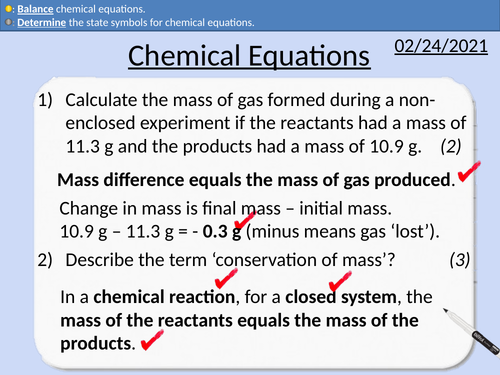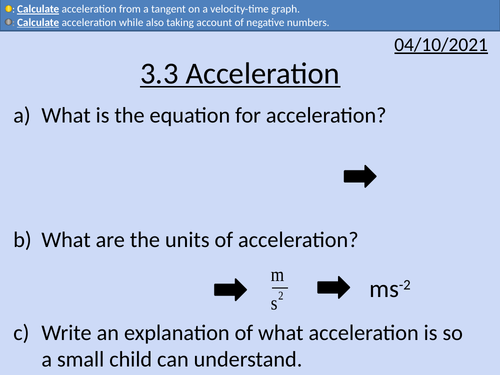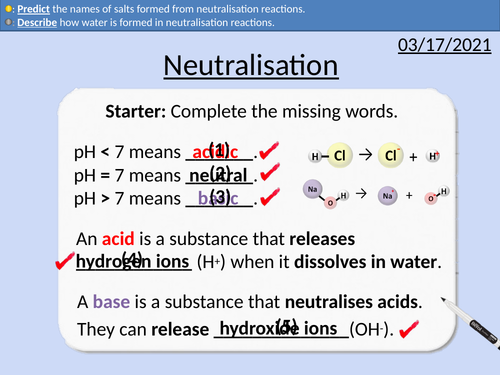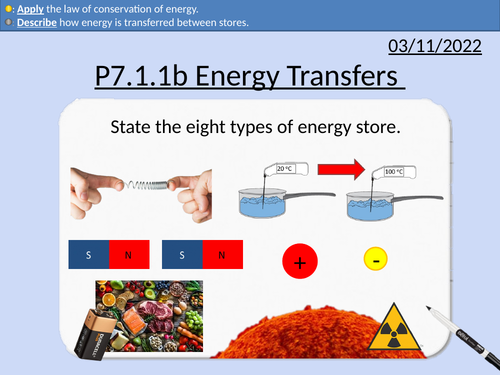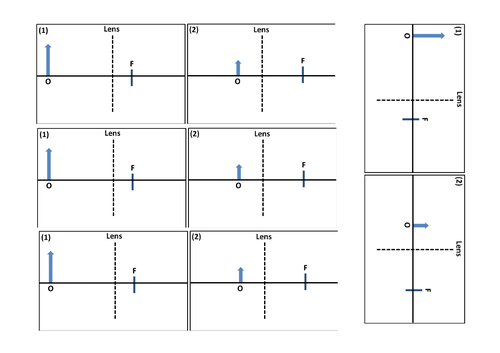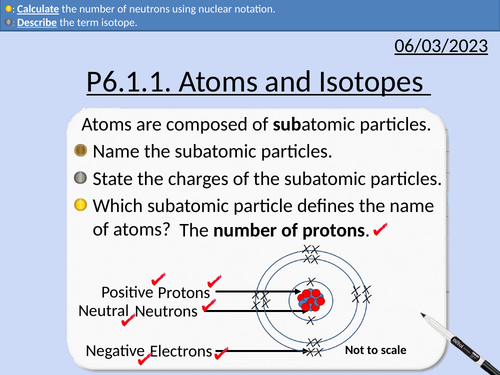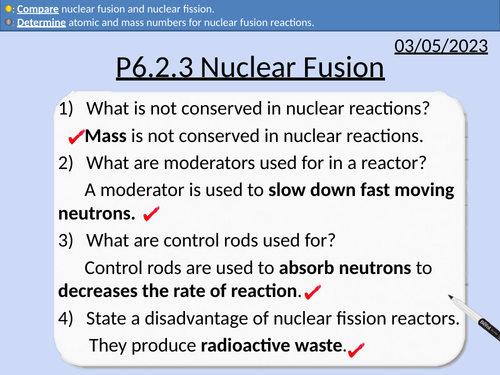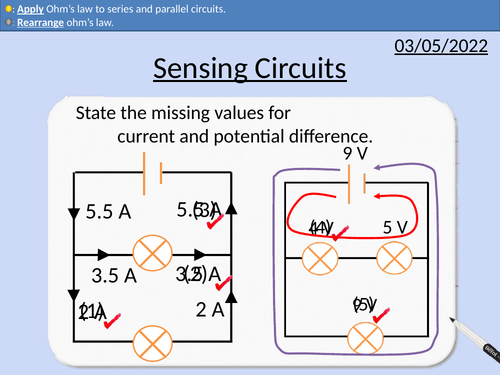496Uploads
163k+Views
70k+Downloads
All resources

GCSE Chemistry: Simple Distillation
This PowerPoint presentation with worked examples and student questions covers:
• Changes of state
• The technique of simple distillation
• Concentration of solute increasing in distillation
• Jobs related to chemistry
• Key word test Insoluble, Soluble, Solvent, Solute, Solution, Distillation, Filtration, and Crystallisation

GCSE Chemistry: Purification and Checking Purity
This PowerPoint presentation with worked examples and student questions covers:
• Choosing the correct separation technique
• Comparisons of mobile and stationary phases for chromatography
• Rf Values
• Analysing chromatographs in gas chromatography

GCSE Chemistry: Thin Layer and Gas Chromatography
This PowerPoint presentation with worked examples and student questions covers:
• Experimental Procedure for Thin Layer Chromatography
• Analysing and calculating Rf Values
• Pros and cons of paper and TL chromatography
• Experimental procedure for Gas Chromatography
• Persuasive writing and embedding literacy in science

GCSE Chemistry: Nanoparticles
This PowerPoint presentation with worked examples and student questions covers:
• Relative size of nanoparticles
• Convert nanometres using standard form
• Uses and dangers of nanoparticles

GCSE Chemistry: Chemical Equations
This PowerPoint presentation with worked examples and student questions covers:
• Pathways into medical chemistry
• State the number of atoms from a chemical formula.
• Properties of metals and non-metals
• Determine state symbols for chemical equations
• Balancing chemical equations

GCSE Chemistry: Conservation of Mass
This PowerPoint presentation with worked examples and student questions covers:
• State the number of atoms from a chemical formula.
• Relative Atomic masses and relative formula mass
• Practical activity of non-closed chemical reactions.

OCR AS Chemistry: Chemical Reactions of Alkanes
OCR AS Chemistry: 12.2 Chemical Reactions of Alkanes
This PowerPoint is a whole lessons included with student activities, animated answers, homework questions with answers provided.
This lesson covers:
Combustion reactions
Incomplete combustion reactions
Balancing equations
Using algebraic equations
Radical substitution reactions
Reaction mechanism for haloalkanes - Initiation, Propagation, and Termination
Monosubstituted (positional isomers) isomers

OCR AS Physics: Combining Resistors
OCR AS Physics A: Combining Resistors is a part of the Module 4: Electrons, Waves, and Photons. PowerPoint with worked examples and homework.
Rules for adding resistors in series and parallel
Applying adding resistors in series and parallel

OCR AS Physics: Paying for Electricity
OCR AS Physics: Paying for Electricity is a part of the Module 4: Electrons, Waves, and Photons. PowerPoint with worked examples and homework.
Converting time to hours
Using different units for electrical energy
Converting from J to kW hr
Calculating the cost of using different electrical appliances.

GCSE Physics: Current and Magnetic Fields
This presentation covers OCR Gateway Physics 9-1 P4.1.2 Current and Magnetic Fields.
Current Produces Magnetic Fields
Experiment to Demonstrate Magnetic Field Lines
Right-hand Corkscrew Explanation
Solenoids
MRI imaging

GCSE Physics: Magnets and Magnetic Fields
This presentation covers OCR Gateway Physics 9-1 P4.1.1 Magnets and Magnetic Fields.
Rules for repulsion and attraction
Magnetic Field Line Rules
Magnetic field density and magnetic force
Modeling the Earth as a Bar Magnet
Permanent and Induced Magnets
Magnetic Domains

OCR AS level Physics: Acceleration
OCR AS level Physics: Acceleration is a part of the Module 3: Forces and Motion
Presentation come with worked examples, solutions and homeworks.

GCSE Chemistry: Neutralisation Reactions
This PowerPoint presentation with worked examples and student questions covers:
• Word equations for neutralisation reactions
• Describing how ions form salts
• Describing how water is formed
• Predicting the names of salts formed

GCSE Physics: Energy transfers and Conservation of energy
This presentation covers OCR Gateway Physics 9-1 P7.1.1b Energy stores transfers and Conservation of energy.
This PowerPoint covers while including student activities and worked answers:
The law of conservation of energy.
The energy transfer pathways:
Mechanically – with forces
Electrically – with current
Heating by particles
Heating by radiation
Describing stores and transfers for:
Object projected upwards or up a slope,
A moving object hitting an obstacle,
An object being accelerated by a constant force,
A vehicle slowing down,
Bringing water to a boil in an electric kettle

GCSE Physics: Lenses
This presentation covers OCR Gateway Physics 9-1 P5.3.2
Includes student activities and full worked answers.
Convex and Concaves lenses
Eyes and corrective lenses
Refraction and wavelength
Focal points for lenses
Determining the type of images produced through a lens

GCSE Physics: Atoms and Isotopes
This presentation covers OCR Gateway Physics 9-1 P6.1.1 Atoms and Isotopes
All presentations come with student activities and worked solutions.
Structure of atom
Properties of subatomic particles
Atomic Number
Mass Number
Nuclear Notation
Calculating the number of neutrons

GCSE Physics: Electromagnetic Waves
These presentations cover the OCR Gateway Physics 9-1 P5.2.1 Electromagnetic Waves. Includes student activities and full worked answers.
Order of the electromagnetic spectrum
Wavelength and frequency relationship
Application of wave speed equation
Rearranging equation
Producing and detecting radio waves

GCSE Physics: Nuclear Fusion
This presentation covers OCR Gateway Physics 9-1 P6.2.3 Nuclear Fusion
This PowerPoint is a whole lessons included with student activities and animated answers.
Mass and energy equivalence
Nuclear fusion conditions
Fuel for nuclear fusion
Benefits of nuclear fusion
Nuclear equations
Comparing nuclear fusion and fission

GCSE Physics: Sensing Circuits
This presentation covers OCR Gateway Physics 9-1 P3.2.7 Sensing Circuits
Potential difference in series and parallel circuits
Lamps in series and parallel
Gravitational potential and potential difference
LDR and Thermistor in potential divider circuits
Using LDRs to control security lights
Using thermistors to control heating/cooling circuits
Exam questions with worked solutions





